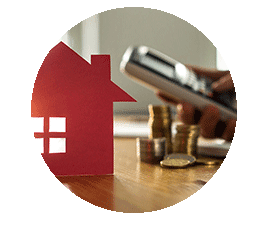If you own a home in Canada, you have likely heard the term "second mortgage." However, you may not know what a second mortgage entails or how to get one. Even if you are one of the 70% of homeowners in Canada who has outstanding mortgage payments, you are likely still eligible for a second mortgage.
Today, the experts at Insurdinary present you with the following guide on second mortgages to clear up your questions about the different types of second mortgages, why they're useful, and how to qualify.
What Is a Second Mortgage?
A second mortgage is a type of loan that you can apply for using an already-mortgaged property as collateral. When you apply for a second mortgage, most institutions will lend you less than what your original mortgage is worth. The second mortgage provider will most likely also apply a higher interest rate than your current mortgage to this new loan.
Do I Need a Second Mortgage?
The most common reasons to take out a second mortgage include:
- Debt consolidation: Many Canadians have outstanding debt they need to pay off. Taking out a second mortgage can allow you to pay off high-interest loans and consolidate your debt for ease of payment.
- Home improvement funds: Some homeowners take out a second mortgage so they can invest the money back into their homes. Home improvement projects often raise property value and can help the owner see a major return on their investment.
- Large purchases: Large expenses are part of life, whether unexpected or planned. Taking out a second mortgage can help pay for these costs, such as children's school or university expenses, business affairs, etc.
- Further investments: Some homeowners take out a second mortgage so they can put a down payment on another property of at least 20%. You may want to buy a second property to rent out or vacation in. Whatever the purpose, a second mortgage can provide liquid funds to achieve this goal.
Want to Know How Much You Need?
Calculate your second mortgage payments using a mortgage payment calculator.
TAKE ME THEREHELOC vs Home Equity Loan
Homeowners get one of two types of loans when taking out a second mortgage: a HELOC or a home equity loan.
HELOC
A HELOC is a credit line that you can access and repay whenever you want. You won't get the money initially as a lump sum, but you can borrow up to a pre-determined amount, very much like a credit card. As the outstanding balance is being paid, the amount of funds available to you are being replenished meaning you have the ability to borrow against it if you have to using as little or as much that is required.
Most HELOCs have interest rates of 2.5 to 3% (or more) and require that the borrower has a good credit score. You should have also already paid 20% equity into your home before taking out a HELOC.
Do I Qualify for a HELOC?
In order to qualify for a HELOC, you must have available equity in your home. The remaining balance owed must be less than the overall value of your home. In most cases, you should be able to borrow up to 85% of your homes worth minus the amount owed. More to that, a lender will take into consideration your active debts, income, employment history and credit score. This process is very similar to when you were granted your first mortgage, and the documents required will be have to be provided again.*******
Home Equity Loan
Unlike a HELOC, financial institutions pay a home equity loan as a lump sum. If you have paid less than 20% equity on your property or don't have a good credit score, you are more likely to get a home equity loan rather than a HELOC.
Private institutions often offer home equity loans and provide a much higher interest rate than HELOCs. If you take out a home equity loan, you will likely pay 10 to 15% interest. You will also have make monthly loan payments, just like you do with your mortgage.
Refinancing Your Current Mortgage
If neither a HELOC nor a home equity loan sounds like the right option for you, or if you're simply trying to find a better interest rate for your current mortgage, refinancing may be a good option for you. When you refinance, you and your mortgage provider renegotiate the terms of your first mortgage, taking into account the equity your home has built as it appreciates. You can always consult the experts at Insurdinary about your choices.
Amount You Can Borrow
According to Canadian government regulations, you can borrow 80% or less of the total equity that you've paid into your home (if you get a HELOC). Thus, you must subtract the remaining unpaid balance of your first mortgage from 80% of the value of your home to determine the maximum amount that you can borrow.
The average Canadian HELOC has a limit of $150,000. However, this does not guarantee that a lender will offer you the same amount.
If you opt to get a home equity loan, the institution may approve a higher amount than 80% equity on your first home. However, to reiterate, the interest rates for home equity loans are usually much higher than HELOC interest rates.
How to Get a Second Mortgage?
If you want to get or qualify for a second mortgage, you must present the following information to potential lenders:
- Current income: Financial institutions will assess your income to determine whether you can handle the extra payment required by a HELOC or home equity loan. If your income is high enough, they will likely approve your loan.
- Paid equity in your first home: If you have paid less than 20% equity into your current home, you won't qualify for a HELOC. However, some lenders may consider you for a home equity loan if you've paid at least 5% equity or more and fulfill their other requirements. If you've paid more than 20% equity into your current home, you're more likely to qualify for a HELOC.
- Credit score: The higher your credit score, the more likely that a financial institution will approve you for a HELOC or home equity loan. Credit scores of over 650 points prove that you are responsible enough to make payments on time, which is a green flag for lenders. Higher credit scores also obtain the best interest rates, which will lower your overall payment.
Can a Second Mortgage Help with Bad Credit?
Taking out a second mortgage can potentially improve your credit score. If you get a second mortgage and pay off your outstanding and late debts, you can start fresh. You could potentially establish good repayment habits and raise your credit score by proving that you consistently pay your second mortgage bills on time.
However, when considering a second mortgage, do your research. Make sure that it is the right option for you, and calculate the necessary financial habits that you must establish after taking out a second mortgage. You can use a mortgage calculator to help you project future costs.
What Are the Benefits of Paying Interest Only?
In some cases, you can pay for only the accrued interest on your loan rather than the outstanding principal. This allows you to use liquid assets to achieve goals, such as home renovations or investments into a second property, that will make money before you pay off your second mortgage in full.
Using liquid assets from a second mortgage for investment purposes is a great way to both pay off and capitalize on your loan. Start by making interest-only payments and using your liquid assets to establish the investment you plan to make. Once you have properly set up your investment, you can pay back the second mortgage and continue to capitalize on your new property or plans!
Get the Mortgage You Want at the Best Rates
Compare mortgage rates online now with a rate comparison tool.
COMPARELooking for Help with a Second Mortgage?
When it comes to taking out a second mortgage, you must research and compare rates and financial institutions to make an educated decision. That's where Insurdinary can help. On our site you can research companies, collect offers, and discover the best options to choose from.





